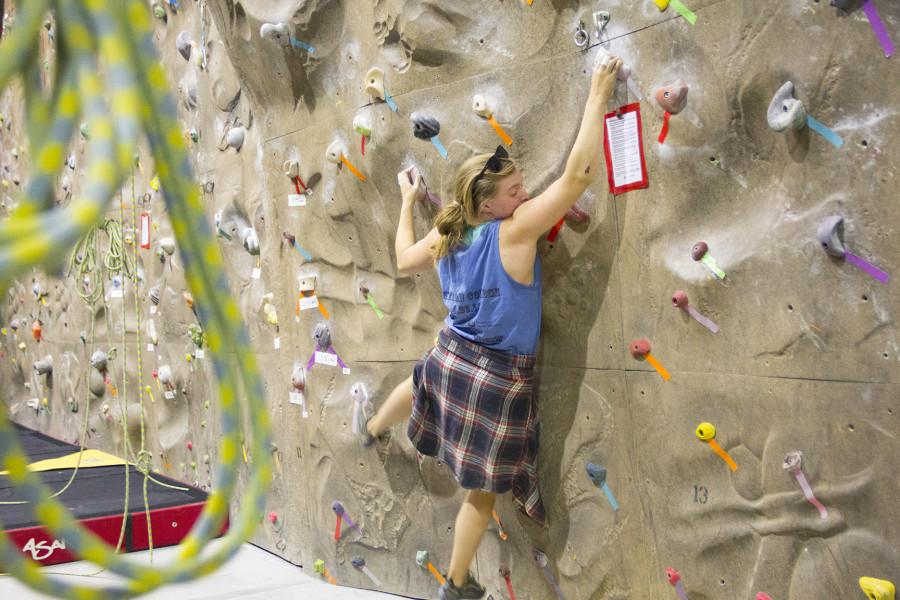
This article was co-authored by Maren Schiffer.
Many people often assume that spirituality and higher education are mutually exclusive concepts: that being educated somehow inherently means that it is impossible to be spiritual. Yet Whitman College, a school of self-proclaimed academic excellence, is also home to numerous religious groups and is considered a formative place of spiritual understanding by many.
Defining ‘spirituality’
Stuart Coordinator of Religious and Spiritual Life Adam Kirtley understands that spirituality can mean different things for everyone and is a difficult term to define given its deeply personal nature.
“Spiritual life is often referred to as meaning-making, reflectiveness, paying attention to the interior self and drawing connections with what you’re experiencing as a student and what it means to be a human being,” he said.
Similarly, when asked to define the word “spirituality,” students frequently mentioned the words “being”, “meaning” and “connection”.
“A broad definition of the word could be the way you connect to God: but it doesn’t have to be God: it could be nature or something supernatural or omnipotent,” said sophomore Ami Koreh.
“I think spirituality is the acknowledgment of a being external to oneself, trying to understand things beyond oneself. If you believe in a God that created you, this necessarily insinuates that God created you for a purpose, and so you try to fulfill that aspiration or purpose,” said sophomore Stan Walmer.
Most Whitman students do not struggle with the concept of spirituality in and of itself. The problem students most often face is how to best convey this spirituality.
“Whitman has a student body that sees themselves as valuing spirituality, but many of them struggle to find the language to express that spirituality,” Kirtley said.
College as a setting for spiritual exploration
According to a national survey conducted by the “Spirituality in Higher Education” group, college can be a very formative and important experience in many people’s spiritual lives. The study concluded that the academic environment, along with the diverse and close environment on a college campus, can lead to a substantial growth in spiritual qualities as defined by the study, even while engagement in religious activities tends to decline.
The most important thing for a college to do in this respect according to the study is to provide spaces for spiritual expression and interfaith dialogue in order to provide ample opportunities for students to engage with their “inner selves”.
Kirtley has taken this as a goal of his office since its shift from a strictly counseling position to a programmatic office in the fall of 2009. Recently, his office brought David James Duncan to campus as a perspective on religious devotion and spiritual engagement outside of organized religion.
While Kirtley does spend time reaching out to prospective students whose beliefs align with under-represented religious groups on campus and working to support the existing religious groups against oppression, the more widespread aspect of his job is in promoting spiritual engagement: a purpose widely supported by the administration and the college as a whole. His office recently conducted a survey about religious and spiritual life on campus.
“I do have a sense in which I am supported by the institution and have it as a professional goal to engage the broader Whitman community to engage their student body,” said Kirtley.
With most students leaving home for the first time, college gives them the chance to explore their beliefs and their connection to everything else; many students feel naturally inclined to explore other ways to meditate, worship or reflect.
“I was raised in a Christian home: I went to church and youth group, and I had Christian friends. But living, pursuing what the Bible actually says, living in constant pursuit of spirituality: that didn’t happen until I left home. Before it was basic, simple, more about myself,” said junior Miriam Garber.
For some the journey involves experimenting with new practices, while others focus more on academic enlightenment. And often, the search extends beyond the time at college.
Sophomore Siena Picchi-Dobson did not become interested in seeking spiritual beliefs until her final years at Evergreen College, where she earned her first B.A. degree in International Studies before commencing her second undergraduate degree at Whitman. She transferred to Evergreen from Oberlin College, where most of her attention was directed toward her academic pursuits.
“I was pretty focused on academics; I wasn’t even Christian then. I identified myself as an environmental activist and became interested in social justice, too. Nature was pretty much my spiritual leaning, if there was one,” she said.
Picchi-Dobson became more interested in exploring her spiritual leanings after Evergreen, when she travelled to Thailand to teach English. There, she explored Buddhism, then studied meditation in Burma. Now, she identifies herself as a Christian but also practices Buddhist meditation.
Seeking spirituality at Whitman
With only 42 percent of the student body claiming a religious preference (according to Kirtley’s survey), spirituality and religious adherence at Whitman is statistically below the national average. However, the Pacific Northwest as a region is considered to be one of the least religious parts of the country. Whitman fits within the national trend.
At some point during the first year at Whitman, each student may grapple with questions of deep spirituality. Most will read Kant, explore Plato and struggle with Descartes for three hours each week, then move on to the next book for class. Some students, however, find greater meaning in these texts. They read the Bhagavad Gita or Augustine’s “Confessions” and find in them a way of better understanding and dealing with the world.
“In Encounters we teach all of these texts that ask all these questions about what it means to be a human being and how do you live justly in an unjust world,” Kirtley said. “Yet we often don’t take that from the class and see how it can be applied to how we live in our world.”
At Whitman, open dialogue about spirituality is one of the strengths of our community: a wide range of beliefs and practices are explored in the classroom and beyond.
“The community here inspires you to explore others’ beliefs, get to know them more. I talk with my housemate, who’s Christian, about religious ideas and explore the similarities between our religions,” said senior Trang Pham, who identifies as a Buddhist. “By going to school here, I’ve observed the religious practices of others and am able to compare them to my experiences [in Vietnam].”
The generally curious intellectual atmosphere encourages conversation among students regarding spirituality, which might be less likely to occur in other settings.
“In high school it was easy to find friends that agree with you and people to hold a five minute conversation with. Here, I can have extensive discussions about spirituality with people that have radically different positions than mine,” said sophomore Will Stark.
“In Burma, everything is so formal, the spiritual tradition is so dense. Here, the mind-field is so open, which is a great thing. There are always opportunities for open dialogue, especially one-on-one with professors,” Picchi-Dobson said.
Sophomore Spencer Wharton created AHA! (Atheists, Humanists, & Agnostics) with the hopes of specifying such wide spiritual discussion. When he came to Whitman, there were many established religious groups, and he felt there should be an opportunity for students to discuss beliefs that question or doubt the existence of the supernatural. The academic environment has allowed him to both accept and explore his beliefs.
“We are in an environment where we are encouraged to be curious, ask questions about the world. For me personally, learning and satisfying my curiosity is a spiritually fulfilling way to approach life … While non-believers follow questions to an agreed-upon location, the act of questioning this location is not in any way discouraged. It’s important to ask what it means to be a non-believer, and what could change your mind,” said Wharton.
This open environment also allows for spiritual exploration through the investigation of various practices.
“In [Whitman Christian Fellowship], we practice different disciplines from different denominations and traditions: like we’ve done Sabbath, foot-washing … It’s just great to see the bond between people of completely different traditions,” said Walmer.
Comparatively, some students find it more meaningful to search for understanding in a scientific or humanistic way.
“Long story short, ‘spirituality’ is not the word I’d use to describe my beliefs. It conjures up the idea that there has to be something supernatural, which is an idea I’m not sure I really like,” said Stark. “In a sense of feeling a connection to the rest of the world, I can find it in a non-supernatural manner … My science classes here have given me a deeper understanding of the principles that govern the universe, and how everything connects.”
Although broad, the dialogue at Whitman only extends so far. Some students feel that there is a lack of spiritual diversity, with most students identifying as Christian, agnostic or atheist.
“Whitman is liberal in that there are so many different beliefs, but I feel like as a Buddhist I am a minority,” said senior Nang-San Hti-Lar Seng.
The lack of pagodas and Buddhist ceremonies here made Seng realize how valuable everyday practice was in Vietnam.
“At home, religion is practiced in daily life, but I kind of took this for granted. Here, we don’t have pagodas to visit. Now, I am more attached to my beliefs from before because I feel that gap, or missing part of me,” she said.
A greater depth of purpose
Ultimately, many Whitman students find deep solace in spirituality, seeing it as a way of expressing the things they experience in college.
“The idea of having a purpose or a meaning in life is something that is fairly endemic to going to college and knowing what you want to do with the rest of your life,” said senior Ari Frink, a member of the Unitarian Universalists on campus. “When you add in your faith to talk about it as the backdrop, it adds in different dimensions and perspective.”










